
Disciplina Kičme, currently working under the slightly altered name of Disciplin A Kitschme, is a Serbian band, one of the two spin-offs of the seminal Yugoslav new wave and later post-punk band Šarlo Akrobata, the other being Ekatarina Velika. Musically, they are best described as an aggressive and artistic rhythmic explosion, experimenting and seeking out new expressiveness while finding inspiration in the traditions of punk rock, funk, jazz fusion, motown, jungle, drum and bass, and the works of Jimi Hendrix.

Dubioza kolektiv is a Bosnian avant-garde dub rock group known for their crossover style that incorporates elements of hip hop, dub, ska, reggae, rock, punk, electronic music, and Balkan music, and for their socially and politically conscious songwriting with lyrics in multiple languages. In 2015, Dubioza kolektiv was referred to as the most popular Bosnian musical act.

dreDDup is a Serbian industrial rock and electronic band.
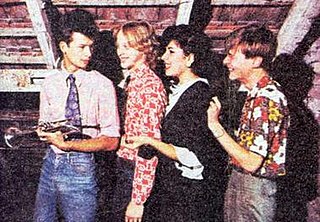
VIA Talas was a former Yugoslav new wave band, notable as one of the participants of the Artistička radna akcija project. The band name featured the prefix VIA added to the former Yugoslav 1960s rock bands, which stands for 'vokalno-instrumentalni ansambl'.

La Grasa de las Capitales is the second album by the Argentine Rock band Serú Girán, released in 1979. After its deeply criticized debut album Serú Girán, the band went in search for a different sound, one that could be closer to the fans' expectations. They grew distant from symphonic rock and became closer to rock while keeping a considerable jazz fusion element in the music, which also was present in the debut album, and to a lesser extent some progressive rock along the way.

Klopka Za Pionira is a noise-rock band from Serbia. Their music is built on improvisation, lyrics written by the band's vocalist Mileta Mijatović. The band has published 11 albums and EPs and two live albums on the independent record label Ne-ton.

Dodole is an album by the Serbian noise-rock band Klopka Za Pionira, released in 2009 on the Ne-ton independent label. This album is considered by many to be their most accessible to date. It took the band nearly two years to record and publish it, while they usually released several albums during one year. Thus it represents their most technically advanced effort. Musically, it contains songs with a more mainstream rock'n'roll approach, standard form and length. The name of the album comes from the lyrics of the song "Pagani", in which the old pagan Slavic ritual of Dodole is mentioned. The cover illustration by Larisa Acikov depicts burning pagan totems.
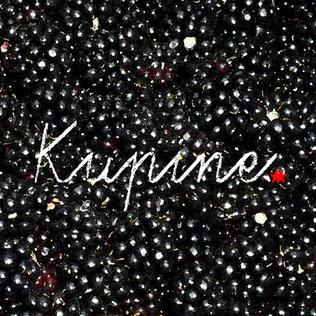
Kupine is an album by the Serbian noise-rock band Klopka Za Pionira, released in 2006 on the Ne-ton independent label. This is one of the more experimental and ambient sounding albums by Klopka, containing long, slowly developing songs with many ambient nature-like sounds but also various machine noises and loops. The album contains very few lyrics, appearing now and then in some of the songs.

Tao Business is an EP by the Serbian noise-rock band Klopka Za Pionira, released in 2007 on the Ne-ton independent label. It has only one song, albeit almost twenty minutes long, which is actually an excerpt from one of the band's sessions with Vladimir Palibrk on drums as a special guest. The whole song was recorded in one take at the Pančevo gallery Elektrika, all instruments at the same time, and is built on improvisation. The result is a drone, noise tune with a free-jazz form. There are almost no lyrics and surprisingly little guitar while the bass guitar, drums and electronics dominate.

Svinje is an album by the Serbian noise-rock band Klopka Za Pionira, released in 2007 on the Ne-ton independent label. It contains eight songs of which some are new versions of songs from the previous album Kupine with significant changes in both music and lyrics. The sound on this album is rich and multi-layered with extensive use of sampling, tape-loops, static noise etc. unexpectedly intercepted by soothing harmonic melodies of instruments such as xylophone. Svinje is the Serbian word for pigs.

Haker ili iskušavanje đavola is the second album by the Serbian noise-rock band Klopka Za Pionira, released in 2004 on the Ne-ton independent label. A big departure from the sound of first album, this album is unique by many standards in the band's body of work. It is the only album without Vladimir Lenhart, since there are no bass lines in any of the songs. Also, there is no guitar and no vocal input from Mileta Mijatović, the band's singer. The whole album consists of various machine buzzes and computer generated noises accompanied by a large amount of sampled voices originating from English translations of speeches by Josip Broz Tito, operas in Serbian, children's educational records, Orthodox chanting, the opening speech from a concert entitled "Trumpets of Peace" held in Sarajevo 1977, "The Internationale" sung in Serbian, various commercials, old Yugoslav movies, SpongeBob SquarePants dubbed in Serbian, etc.
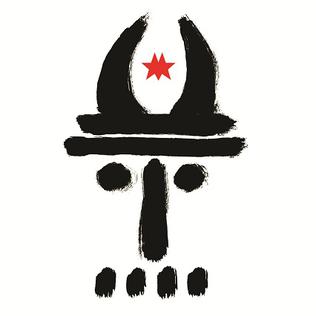
Vratićeš se Satane is the third album by the Serbian noise-rock band Klopka Za Pionira, released in 2005 on the Ne-ton independent label. It consists of ten songs, cover versions of tracks by Satan Panonski, which is unusual for Klopka. It is also unusual for Mileta to sing lyrics that are not his own. The cover art was by Bouraiqc des Merdes.

Jutro u fabrici is an EP by the Serbian noise-rock band Klopka Za Pionira, released in 2005 on the Ne-ton independent label. The album has only one instrumental song of harsh noise consisting of industrial noises and loops treated electronically with many effects.

Neman is an album by the Serbian noise-rock band Klopka Za Pionira, released in 2006 on the Ne-ton independent label. The album's five songs contain no lyrics and are mostly experiments with various noise-making machines that the band was building. The outcome of these experiments can be heard on the following albums, so this was a kind of a showcase of their future work. The songs do not have names, merely numbers that position them on the disk. All of the songs were recorded at once and are first takes and complete improvisations on the spot.

Planetarni čovek is an album by the Serbian noise-rock band Klopka Za Pionira, released in 2006 on the Ne-ton independent label. It is one of the more seriously crafted albums by Klopka, and the first recorded on professional equipment. This album contains a cover version of Tom Waits' song "Poor Edward", Google translated into Serbian. The album cover was drawn by Maja Veselinović.
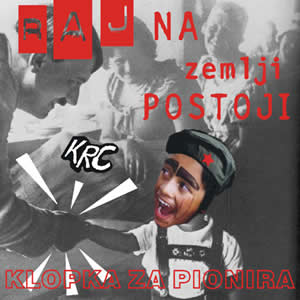
Raj na Zemlji postoji is the first album by the Serbian noise-rock band Klopka Za Pionira, released in 2004 on the Ne-ton independent label. The album is characterized by fast tempo punk-like songs with only clues to the band's future sound.
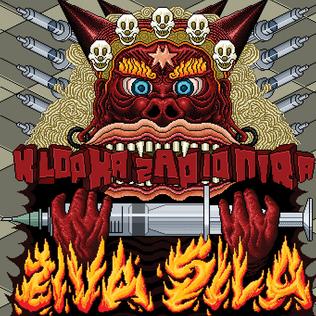
Živa sila is an album by the Serbian noise-rock band Klopka Za Pionira, released in 2011 on the Ne-ton independent label. The band was invited by the organizers of the Koperground festival to play at the 2010 edition, and offered time at a local studio to compose and record a couple of new songs. The result is this album.

Ili 5 minuta ispred tebe is the fourth studio album by the Serbian indie/alternative rock band Obojeni Program released by the Serbian independent record label Tarcus, as well as PGP RTS in 1996.
Teška Industrija is a rock band from Bosnia and Herzegovina, based in Sarajevo. The band have released six studio albums. Teška Industrija have had many line-up changes and a 29-year hiatus (1978–2007).
















